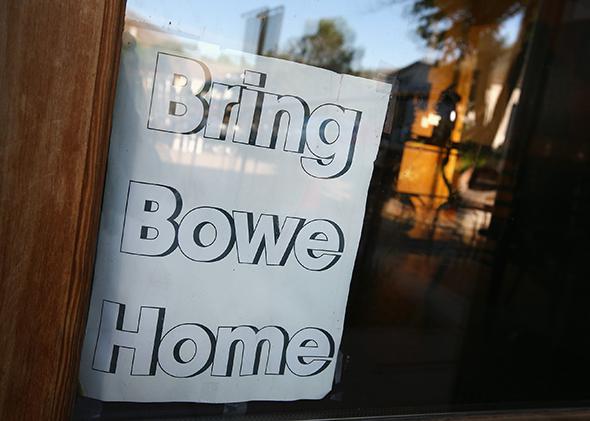The weekend deal that released Sgt. Bowe Bergdahl from five years of captivity, in exchange for five Taliban prisoners, was a relief to his family. But for President Obama, it’s an escalating headache. Critics accuse Obama of setting a precedent that the United States will negotiate with terrorists. They’re wrong, because terrorism is about the exploitation of civilians, not soldiers. But they’re also ignoring the precedent that’s really at stake: keeping our promise to bring home our troops.
The terrorism charge, leveled by Dick Cheney and other Republicans, focuses on the Haqqani network, which held Bergdahl captive. As Wolf Blitzer pointed out Tuesday, this network is on the U.S. State Department’s list of foreign terrorist organizations.
That’s true. But scroll down to the bottom of the list. There, you’ll find the legal criteria for inclusion. They refer to section 140(d)(2) of the Foreign Relations Authorization Act, which defines “terrorism” as “premeditated, politically motivated violence perpetrated against noncombatant targets by subnational groups or clandestine agents.”
Sgt. Bergdahl was not a noncombatant. He was a prisoner of war, captured on the field of battle. Therefore, by definition, his capture wasn’t terrorism. Negotiating for his release, trading enemy combatants for our own combatant, isn’t a concession to terrorism. It’s conformity with the long-standing tradition of exchanging POWs.
According to Sen. Ted Cruz, “The reason why the U.S. has had the policy for decades of not negotiating with terrorists is because once you start doing it, every other terrorist has an incentive to capture more soldiers.” That’s ridiculous. Terrorists didn’t invent the capture of soldiers. It’s a basic military objective, with a standard option to trade the enemy’s soldiers for yours. The reason not to negotiate with terrorists is to discourage the seizure of civilians, not the seizure of soldiers.
So Obama’s critics are wrong to believe that negotiating for Bergdahl sends a dangerous message to terrorists. But they’re also ignoring the message his abandonment would have sent to our troops, their families, and prospective military recruits. It would have betrayed our pledge that if you’re captured in service to our country, we’ll free you.
The Code of Conduct for members of the armed forces, published more than half a century ago, details every service member’s obligations to the military and the nation, even in captivity. In exchange, the code promises:
Just as you have a responsibility to your country under the Code of Conduct, the United States government has an equal responsibility—always to keep faith with you and stand by you as you fight for your country. If you are unfortunate enough to become a prisoner of war, you may rest assured that your government will care for your dependents and will never forget you. Furthermore, the government will use every practical means to contact, support and gain release for you and for all other prisoners of war.
The army’s training pamphlet on being a POW repeats this commitment: “Every captured US individual continues to be of special concern to the US. The US government expresses this concern by … employing every available means to establish contact with you and gain your release.”
In light of that commitment, it’s unwise to focus, as many critics of the Bergdahl deal do, on the circumstances of his capture. They say he left his post without authorization, provoking search and rescue operations that endangered other troops and led to several deaths. None of these claims has been adjudicated, and some of them are already unraveling. But the larger principle is that our allegiance to our soldiers has to be as solid as their allegiance to us. We don’t have to love their character, any more than they have to love the character of their commanders. In the military, loyalty transcends personality. And loyalty goes both ways.
It’s not just Republicans who sometimes forget this. Some Democrats miss the point, too. Tuesday, Obama’s spokesman, Jay Carney, insisted on CNN that Bergdahl served “with honor and distinction” because he “put on the uniform of the United States voluntarily and went to war. … That takes honor and it is a mark of distinction.” No, it’s not a mark of distinction. It’s what every soldier in our volunteer army does. And that’s why we bring these people home. Our promise to them, like their promise to us, is without distinction.
Yes, there are limits to what we should trade for a POW. But “negotiating with terrorists” isn’t one of them. Nor is the alleged carelessness of our captured soldier. From the comfort of a congressional office or a TV studio, it’s easy to talk tough about the messages we send to our enemies. But for the people who put their lives on the line, the crucial messages are the ones we send to our friends: I’ll cover you. You cover me. We’re here for each other. We’ll get you out.
We can’t just say it. We have to mean it, even when it carries a price. Just ask all the soldiers who went to Afghanistan and, unlike Bergdahl, never came home.
